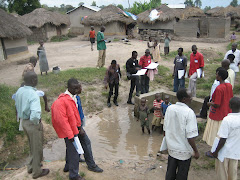WASH in schools is probably Lifewater's best curriculum, because (repeating one of my first entries) it epitomizes the saying
"Give a man a fish and you feed him for a day; show him how to catch fish, and you feed him for a lifetime." In it we provide school teachers with a curriculum and training to teach WASH to children who will teach their siblings, parents and eventually their own children. I was the team leader (having been to Ndola three times before) and three wonderful ladies did most of the teaching.
We were scheduled to leave on Feb 8th, but winter storm Nemo was expected to be right over New York about the time we were supposed to change planes there. Seeing the weather warnings, I called the travel agent who booked all but a couple of my trips -- Laurie at
www.shupingtravel.com. She bailed me and others out in the past and did it again. She apparently called in some favors, because we were able to reschedule to the exact same schedule one week later as the team requested.
We arrived in Ndola somewhat drained but in good spirits. Once again our partner was Seeds of Hope International Partnerships (SoHIP). We were a little concerned to learn that there would be just four students. Our primary contact was Gladys who had been one of our star students in 2009. She promised to take care of it and started making phone calls. We found ourselves visiting head masters of schools
in the area. They welcomed us and heaped praise on SoHIP. One mentioned that SoHIP had constructed a school latrine that was instrumental in keeping the school open. Each child wanted a handshake!

We started class the next day with 17 students including teachers, two
assistant head masters, and one head master. All but one participating school was public. The other, where families could not pay for
school clothes, was supported by a church in Boise Idaho. The children
all seemed to know the importance of an education. If they didn't go
to school, they wouldn't learn to speak English. If they didn't learn
English, they couldn't get a job and would be caught in the vicious
cycle of poverty. Our students were so full of fun and yet so aware of their importance to the children of Zambia. One teaching technique is to make a song that teaches. They came up with some great songs on short notice, but the "Latrine Dance" was unforgettable!

"Teachbacks" are often the best part of our trainings, because they reinforce the lessons. Visiting each school to watch a teacher employ the lessons was particularly enjoyable. The children were very well behaved in spite class sizes of up to 80 and very spartan conditions.
One of our group goes by the nickname of Sky. She founded Bridging the Gap (see the link) which raises funds for WASH programs. She took us to two AIDS orphanages before we returned home. One AIDS orphanage was run by Seeds of Hope (not to be confused with SoHIP -- see link ). It 's beginnings were as a hospice, but the founders found that children were starting to survive and needed a place to
live. They are doing wonderful things for the kids with dorm rooms, classrooms, and a dining hall. We were introduced to a child who was not going to survive and heard his story: The hospital was so crowded with children with AIDS they were sharing beds and in this child's case -- laying on a piece of plastic on the floor. He had a haunting sadness in his eyes but tried to smile for us. Sky took us to another orphanage where AIDS widows were given jobs making attractive purses and other useful items. As they sang to us, we learned that AIDS widows are usually destitute with little recourse. It reminded me of a must read best selling book I read on the way home from Uganda: "Kisses from Katie." What an amazing young woman. I wish I had her courage.















